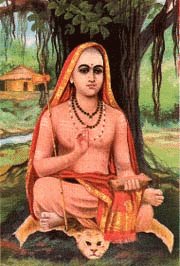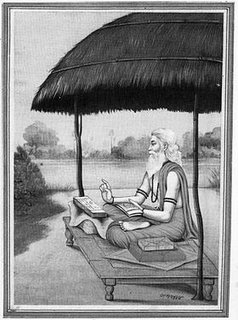 Recently Puttabarthi Sai Baba the saint who's ashram is near our office reached the age of 80. When I was discussing this with a couple of colleagues, one of them said that personally he does not believe in 'God men' like the Sai or the Pope or others. I told him that it was a mistake from our part to worship human beings as Gods (its this blind hero worship that gives rise to dangerous cults led by con men) but still genuine saints deserve to be held in esteem for the sacrifices they make on a day to day basis to maintain their discipline and use that self control as an example in our own lives. I asked him whether he can perform the simple sacrifice of staying without salt in his food for just a week.
Recently Puttabarthi Sai Baba the saint who's ashram is near our office reached the age of 80. When I was discussing this with a couple of colleagues, one of them said that personally he does not believe in 'God men' like the Sai or the Pope or others. I told him that it was a mistake from our part to worship human beings as Gods (its this blind hero worship that gives rise to dangerous cults led by con men) but still genuine saints deserve to be held in esteem for the sacrifices they make on a day to day basis to maintain their discipline and use that self control as an example in our own lives. I asked him whether he can perform the simple sacrifice of staying without salt in his food for just a week.There are several countries in this world that have contributed several things. There are countries that have produced athletes, others have produced warriors and conquerors and still others have produced businessmen and entrepreneurs. India’s greatest contribution is that it is the land of saints, philosophers and spirituality.
In today's world where the emphasis is on a luxurious life filled with every vice imaginable and propagated by every form of the media, it is most difficult indeed for any human being to lead the life of a saint making their sacrifice all the more commendable. Its a miracle for the Sai to remain a saint and that too in a city of pubs and vices like Bangalore. No wonder he stays in Whitefield and never goes to MG Road :-). Yes they do slip up and they do make mistakes and they do sometimes fail in their discipline. After all they are human beings. Its like having a pot of milk with just a drop of poison in it. We do not appreciate the pot full of milk but just point out that it is now poisoned. Such is the life of saints today. My colleague understood the internal struggle men of faith have to put up to maintain their discipline. He also admitted that its only of late that he had lost faith in today’s saints while he really appreciated the contributions of various saints in the ages gone by.
After the discussion I had with my colleague one of the questions was left unanswered in my mind. Why should saints make these sacrifices. Why should they undergo such self-denial. Isn’t it unnatural for a human being to deny himself/herself so much? When I asked my colleague whether he can stay without salt, I asked myself, when salt is available in abundance and cheaply, why should I deny myself?
The Origin of Value Systems
There are two things that separate human beings from the rest of the species on this planet. One is called self consciousness and the other is our ability to write down our experiences so that future generations can learn from our mistakes and not repeat them. Ideally these two aspects should lead human beings to better lives and better happiness as time goes on if only we follow the words of the wise.
 The wise men of the past have indeed written down their experiences and learnings and it is these that we today call the scriptures or the Vedas. These people of experience were called “Seers” which was formed from “See ‘ers” which meant “people who could see” or visionaries. Its these seers who were later called Saints.
The wise men of the past have indeed written down their experiences and learnings and it is these that we today call the scriptures or the Vedas. These people of experience were called “Seers” which was formed from “See ‘ers” which meant “people who could see” or visionaries. Its these seers who were later called Saints.Based on their experiences they found which actions led to long term happiness and which actions gave short happiness followed by sorrow. Its based on these experiences that value systems were formed. Any value system’s basic intent is to help make us healthy, wealthy and most importantly wise.
Some of these values taught to us over the years include respecting our parents, teachers, elders and God and following their advice in all walks of life because they are our genuine well-wishers. Simple living, high thinking, self control, cleanliness in mind and body, respect for life, patience, forbearance, love and devotion and a contented mind are all various values given to us from generation to generation because our ancestors have realized their value.
Being pleasant in the words we say, not carrying tales of others behind their backs and avoiding vices like wine, immoral women, meat and gambling are all encouraged because they lead to long-term happiness.
Unfortunately as time goes on, fewer and fewer people continue to follow these traditions and values and fail to gain from the learnings of past mistakes and continue making the same mistakes again and again. Even worse they make fun of those who do try to follow traditions calling such people “old fashioned” without realizing that those who do not learn from past mistakes are doomed to repeat them.
Even this was foreseen by our forefathers who divided the cycle of life into 4. The Krita Yuga where 100% people follow traditions, the Treta yuga where 75% follow traditions, the Dwapara Yuga where 50% follow traditions and the Kali Yuga (today) where only 25% follow traditions. Even within our own families we are more likely to see our grandparents had some traditions of which our parents follow maybe 75% of which we follow only half and our children may only follow a quarter.
The Necessity of Saints
This alarming erosion of values may mean that soon such values which have been passed on from generation to generation may soon be lost altogether and one day when we wake up from the illusion of short term happiness we live in, we may not be able to find the answers we seek for long term happiness. To ensure that the sayings of the wise are not lost forever, its important that at least some people continue to follow these traditions to set an example for others.
When we are hurt, or in doubt or in fear, or in complete loss of hope who do we turn to? Even when a patient in a hospital is beyond help, a doctor always tells his relatives to pray because miracles do occur. At these times if we do not have a temple or a church or a priest or faith in God to help us in troubled times, to console us , to guide us to give us hope again and to hear soothing words of wisdom imagine the impact such a situation can have on us. It is for this that the existence of wise people following traditions really matter.
So coming back to the original question. Why should I deny myself?
Leading a life of tremendous rigour, practicing prayer and abstaining from social evils takes tremendous discipline which cannot be achieved today that easily by a normal man. It takes discipline of the mind and the body.
In many ways leading such a life is like being an Olympic athlete. It requires tremen
 dous sacrifice, discipline and determination. To control the body an Olympic athlete needs adrenalin and testosterone which he triggers by tremendous amounts of exercise and dieting. Similarly to make sure that a Saint is not affecting by physical desires which are caused by hormones, they too have a special diet which is mostly vegetarian and special fruits that reduce desire like papaya, pineapple and other herbs. They totally abstain from meat, spicy food, too much salt and oil and needless to say alcohol to ensure the hidden animal in them does not come out. They also control their mind using meditation, prayer and Yoga which are all accepted by today’s Medical professionals. Why is it that we do not laugh at an Olympic athlete but only make fun of a saint’s way of life?
dous sacrifice, discipline and determination. To control the body an Olympic athlete needs adrenalin and testosterone which he triggers by tremendous amounts of exercise and dieting. Similarly to make sure that a Saint is not affecting by physical desires which are caused by hormones, they too have a special diet which is mostly vegetarian and special fruits that reduce desire like papaya, pineapple and other herbs. They totally abstain from meat, spicy food, too much salt and oil and needless to say alcohol to ensure the hidden animal in them does not come out. They also control their mind using meditation, prayer and Yoga which are all accepted by today’s Medical professionals. Why is it that we do not laugh at an Olympic athlete but only make fun of a saint’s way of life?Yes there are scandals within sainthood just as there are scandals of doping among Olympic athletes. But why do we still celebrate the Olympics? Its because it shows what a human being can achieve if he sets his mind on pushing the boundaries of his body. In similar ways a Saint’s life shows what human beings can achieve if we push the boundaries of our body, mind and soul.
No comments:
Post a Comment